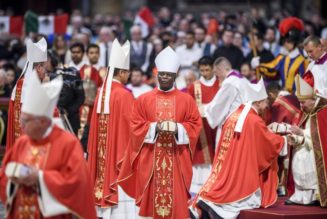ROME – As the war between Israel and Hamas intensifies on the Gaza Strip, so too does diplomatic activity intended to prevent a wider regional conflict. U.S. Secretary of State Anthony Blinken, for instance, currently is setting new records for frequent flyer miles in a single week, visiting virtually every Middle Eastern capital of note.
Amid this diplomatic frenzy, one interesting bit of subtext is the growing exchange between the Vatican and Iran, most recently expressed Sunday afternoon in a phone call between Iranian President Ebrahim Raisi and Pope Francis. That conversation followed another a week before between Archbishop Paul Gallagher, the Vatican’s Secretary for Relations with States, and Iran’s Foreign Minister Hossein Amir-Abdollahian.
Notably, both conversations were initiated at the Iranians’ request, according to statements afterwards from both sides.
While it might be tempting to see these largely as symbolic courtesy calls, in fact there are good reasons to believe the Vatican may be positioned to play a key role in persuading Iran to exercise restraint and to avoid escalating the conflict beyond a point of no return.
As is well known, Iran has warned both Israel and the U.S. that the war could expand if Tel Aviv presses the fight beyond the Gaza Strip. Israel already has bombed positions in Lebanon and Syria, both places Iran regards as key allies, and there’s growing concern about the role of Iranian-backed militias in accelerating attacks on Israeli targets.
One principal agenda item for Blinken over the weekend was to send clear signals to Iran to back off, but there’s no a priori reason to believe that Tehran will be inclined to take its cues from the American government. The Vatican under Pope Francis, on the other hand, might stand a decent shot at getting through.
To begin with, the Vatican and Iran have had diplomatic relations since 1954, 30 years longer than the Vatican and the United States. The relationship not only survived the 1979 Iranian revolution, but in some ways became even stronger as the Shiite Islamic identity of Iran became a stronger element of its foreign policy.
There are three basic reasons for the affinity between Rome and Tehran.
First, Iran’s leadership class isn’t motivated solely by Realpolitik, but also by theological convictions. Raisi, for instance, occasionally refers to himself as “ayatollah,” and although his claim to that title is disputed, there’s no question that he’s a Shia cleric and jurist who studied at the holy city of Qom.
According to a read-out of the call with Pope Francis provided by Raisi’s office, the Iranian leader at one point argued the supporting the Palestinians is in accord with the tenets of all three Abrahamic religions, including Christianity.
Iranian leaders operate in a psychological and cultural matrix in which such religious convictions matter, but most Western leaders simply can’t engage them on that level. Joe Biden, for instance, or Rishi Sunak, or Emmanuel Macron, aren’t going to trade insights with Raisi about comparative treatments of the Holy Land in the Quran and the Bible – they’d be out of their depth, and anyway, Western concepts of church/state separation would make doing so inappropriate.
The pope and his diplomatic team, however, can meet the Iranians on their own turf, so to speak, from within a shared universe of spiritual and theological convictions.
Second, there are several striking parallels between Catholicism and Shia Islam, which make the two traditions natural conversation partners. Iranian writer Vali Nasr, author of the 2006 book The Shia Revival, argues that the divide between Sunni and Shia bears comparison to that between Protestants and Catholics, with Shia being the branch closer to Catholicism.
When a Shia Muslim talks about the great feast of Ashura, for example, which in their tradition commemorates the martyrdom of Husayn ibn Ali, a Catholic immediately will flash on Good Friday and their shared theology of sacrificial death and atonement, as well as shared devotions such as fasting, mourning and even reenactments of the passion.
That’s context which, frankly, only the Vatican among today’s major diplomatic players can bring.
Third, strictly at a policy level, Iran and the Vatican under Pope Francis in many respects have a shared agenda.
Both aspire to a more multilateral world order, no longer dominated exclusively by the Western powers and especially the United States. Francis is a key backer of the BRICS alliance, of which Iran is one of six newly minted members, and the pope can be counted upon to continue to encourage the emergence of BRICS into a genuine economic and strategic counterweight in global affairs.
Iran is also key to Francis’s broader project of détente between the West and the Islamic world. Across what’s known as the “Shia Crescent,” including Lebanon, Syria, Bahrain, Iraq, Iran, Azerbaijan, Yemen and western Afghanistan, the population is either majority Shia or at least there’s a strong Shia minority, and Iran has had no higher foreign policy objective in recent decades than to expand its influence across the region.
For the pope’s inter-faith project, therefore, Iran is indispensable to relations with the roughly twenty percent of the Muslim world that’s Shia, making it a strong perceived priority for Francis and his team to keep the relationship with Tehran strong.
One sign of the pontiff’s solicitude came in March 2021, when Francis travelled to the holy city of Najaf during his visit to Iraq to meet Grand Ayatollah Ali al-Sistani, a meeting that left a deep impression across the Shia world. Iraq swiftly declared March 6, the date of the encounter, a national holiday as the “Day of Tolerance and Coexistence.”
The Iranians, meanwhile, are seeking moral legitimacy as a firebreak against the impact of US sanctions, and see their bonhomie with the pope as an important “soft power” asset.
For these reasons, the Vatican arguably is better positioned to engage Iran, keeping lines of conversation open and avoiding potential misunderstandings, than any other diplomatic actor located within the historical boundaries of the Western world.
The entire global community has a rooting interest, therefore, in hoping that the Vatican spends this unique spiritual and diplomatic capital wisely as the Gaza crisis continues to unfold.








